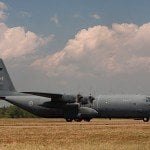The team of engineering students from the University of Toronto that successfully flew a human-powered helicopter on June 13 has been awarded the American Helicopter Society/Igor Sikorsky Human Powered Helicopter Competition prize of $250,000. AeroVelo Inc. is the Toronto team’s company, led by a pair of U of T engineering graduates, Todd Reichert and Cameron Robertson. The prize, according to AeroVelo, is the third largest in aviation history.
The Sikorsky challenge was first issued in 1980. It has taken until now for anyone to successfully meet the conditions. The human-powered helicopter had to rise three metres and hover in place over a 10×10 metre area for one minute. The AeroVelo machine, called Atlas, reached the required height and remained aloft for 64.11 seconds, remaining within the prescribed area. The award was presented to Reichert, who “piloted” the Atlas, and Cameron, at the soccer centre where they made the successful flight.
In the years since the Sikorsky challenge was issued, more than twenty attempts have been made to meet it, none coming close. The longest flight before Atlas was 19.5 seconds, achieved by a Nihon University team in the 1990s. The AeroVelo Atlas is the first Canadian attempt, and also the largest, with four rotors measuring nearly 70 feet each. The blades are made from polystyrene, balsa wood and “incredibly thin” mylar film. The light carbon tube and polymer airframe weighs 115 pounds, and is powered by a modified bicycle frame. More technical information about the Atlas can be found here.
Reichert was selected to fly the Atlas in part because of his athletic background: he is a “national-level speed skater” and competitor in human-powered vehicles. He also has experience. It was Reichert who flew the world’s first human-powered “ornithopter” in September 2010. In that demonstration, he flew the craft, whose wings flap in mimicry of a bird’s wings, for 19.3 seconds, entirely on his own power, after being towed by a pickip truck to become airborne. The craft has the wingspan of a Boeing 737 but a weight that could be easily carried by the average person. That flight got him and his partners into the Fédération Aéronautique Internationale record book.
AeroVelo is an “elite” design and innovation lab, according to its website, with a mission to challenge conventional design and lead the way to a “healthy and sustainable future.” In a statement following their win, AeroVelo said that innovative engineering and creative design can help the world find sustainable and environmentally conscious solutions to the technological challenges that face it.






























